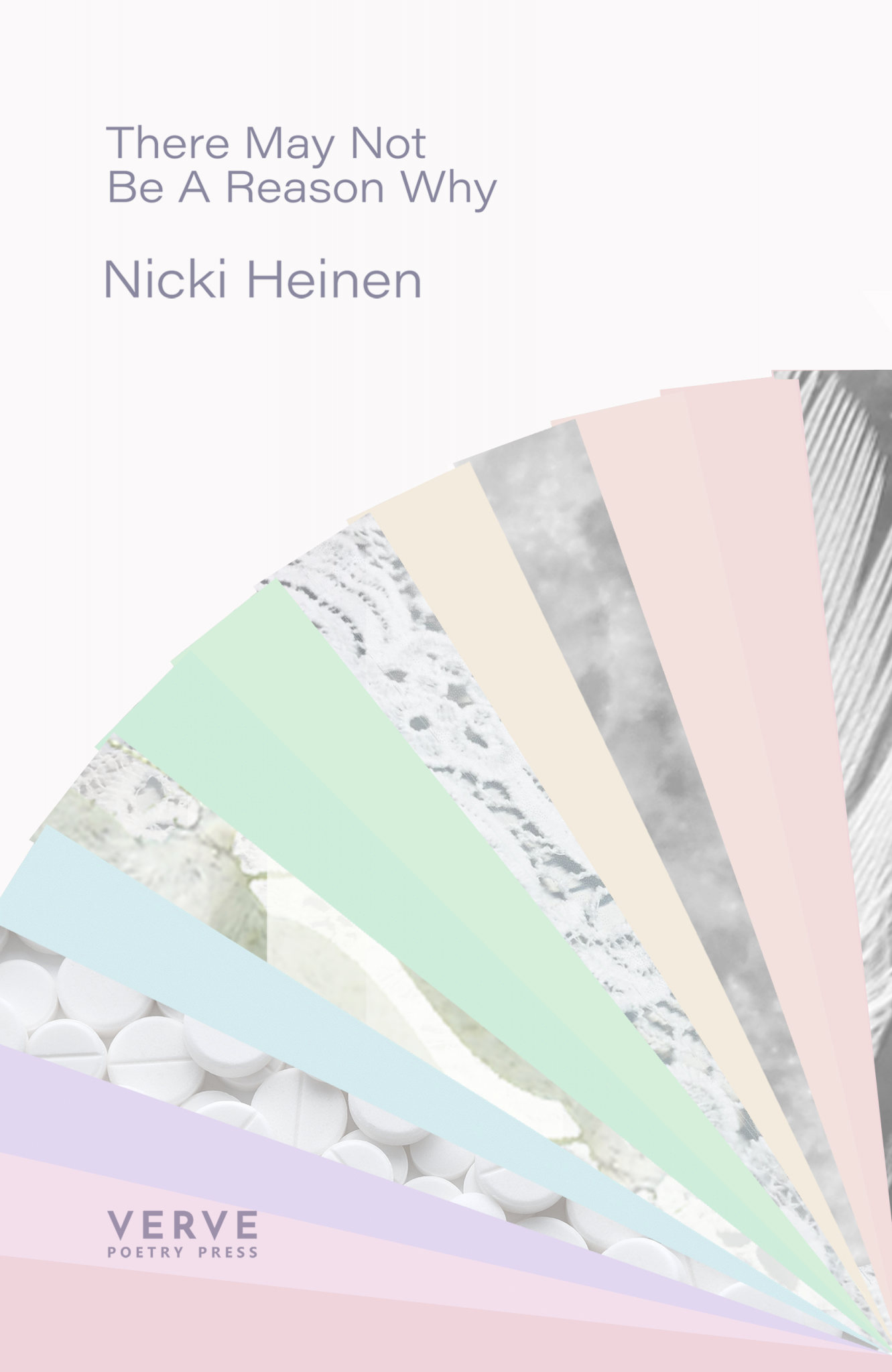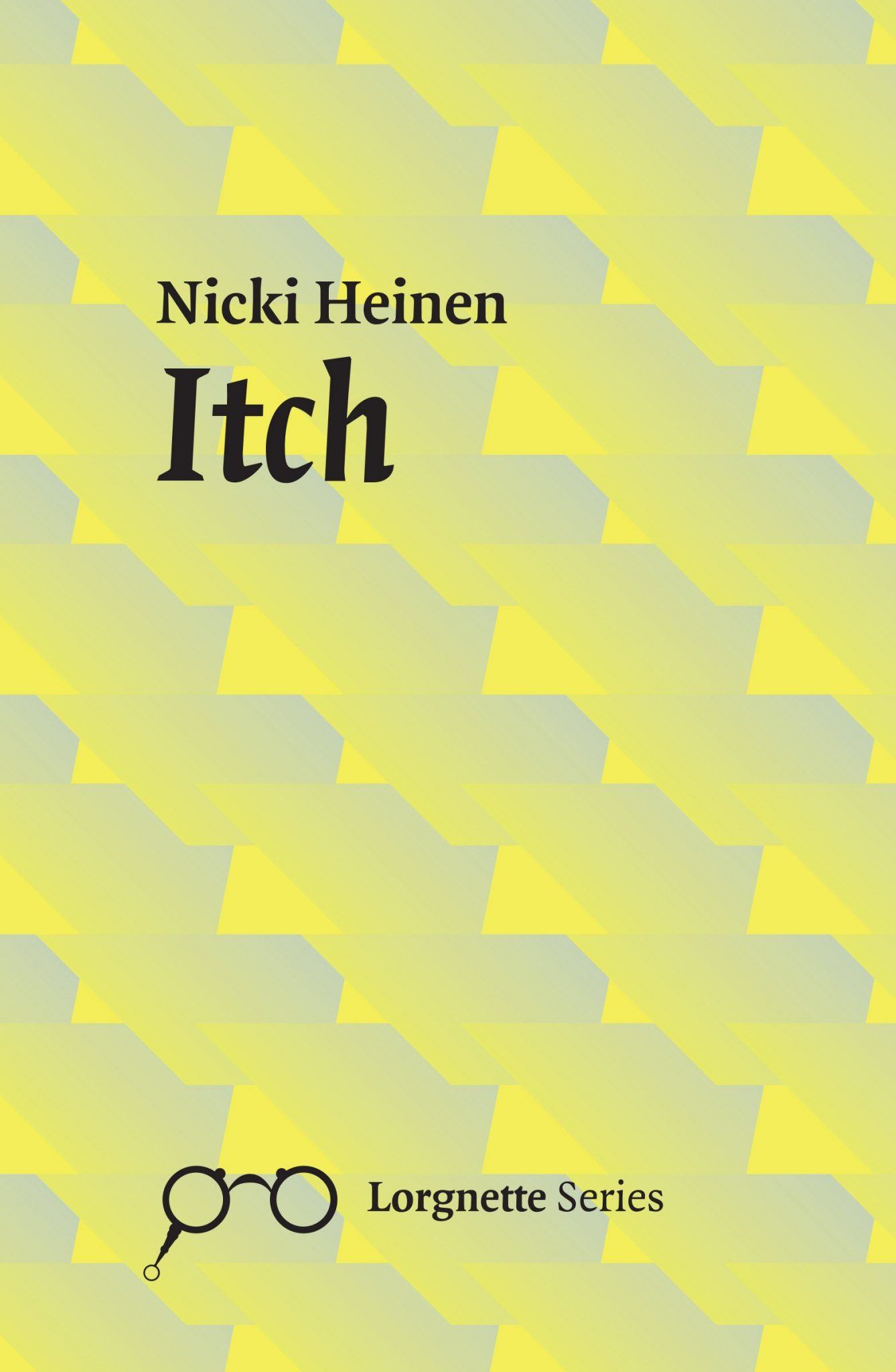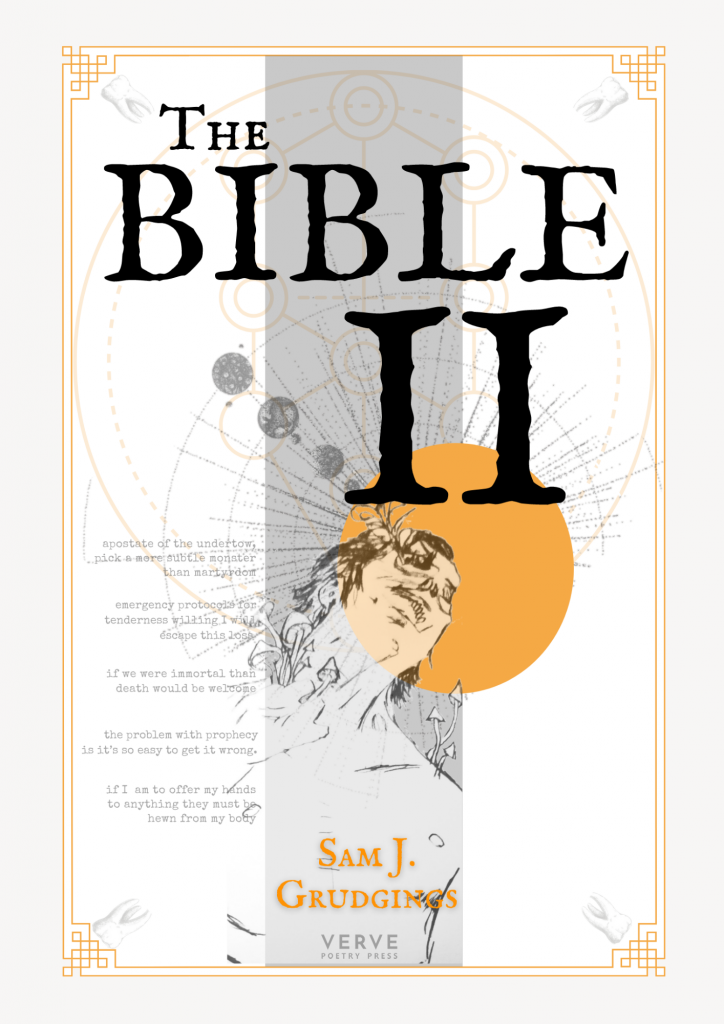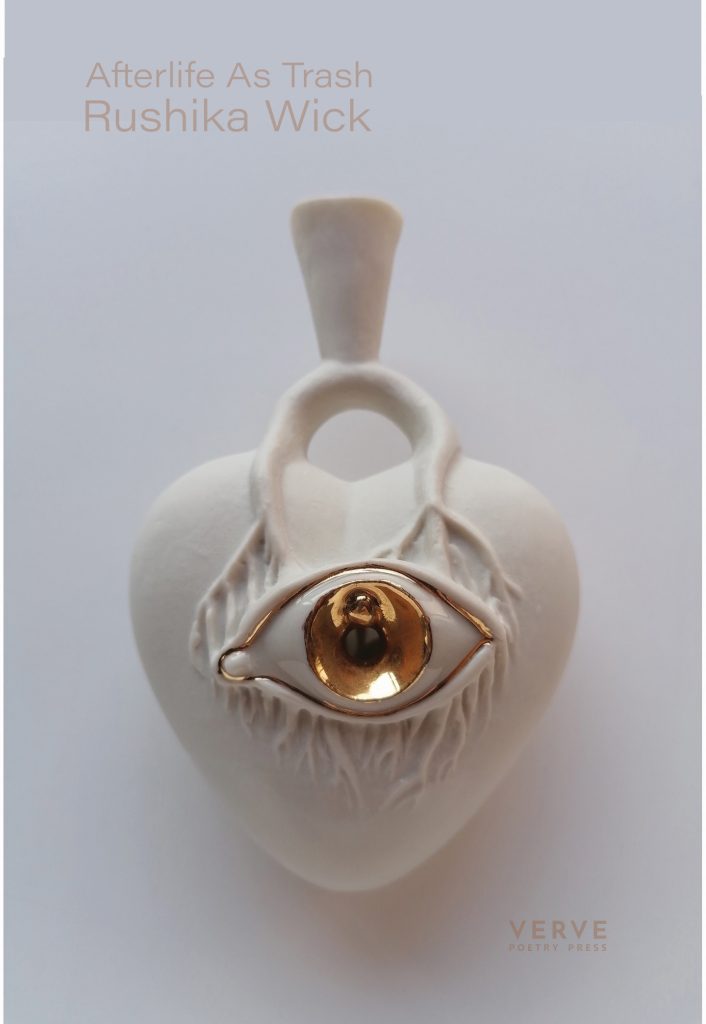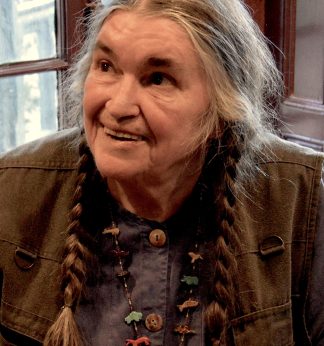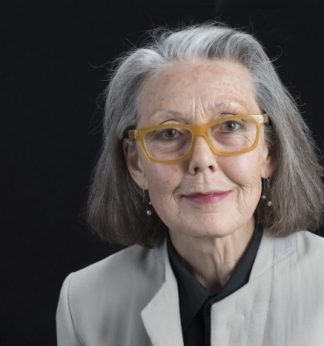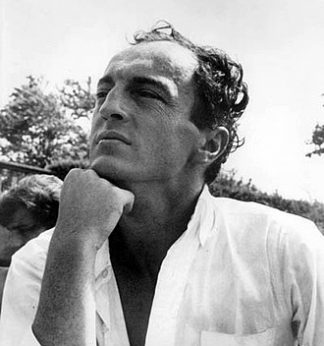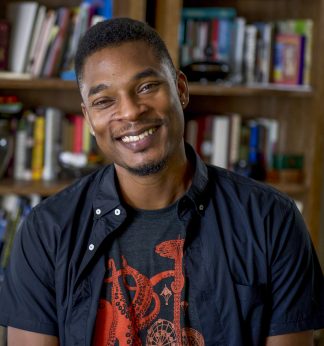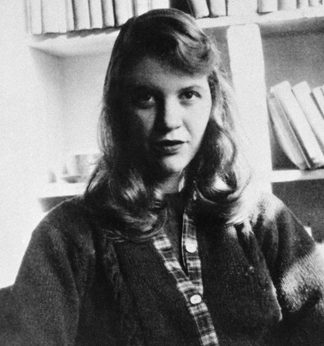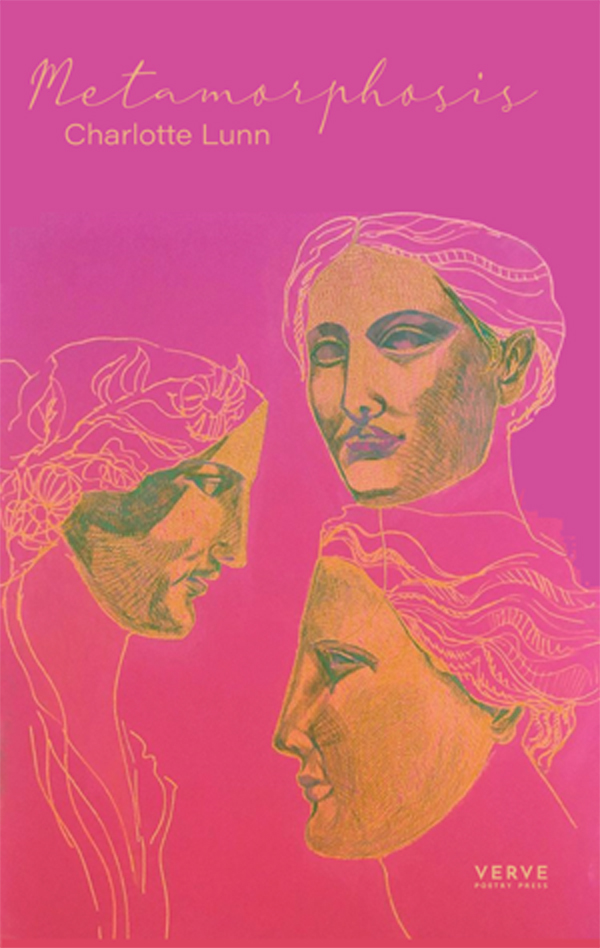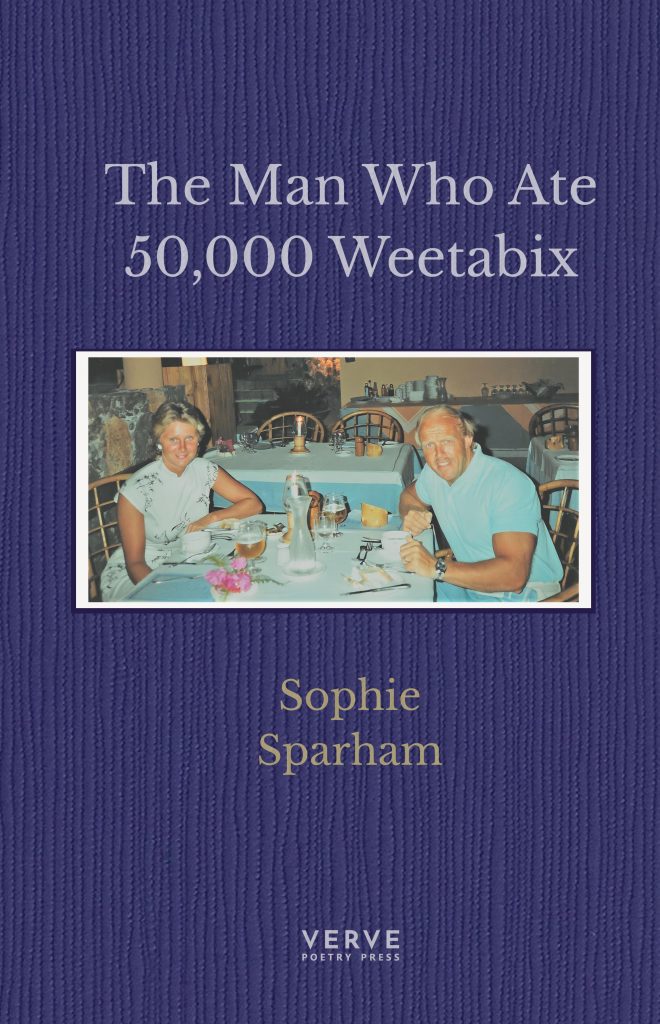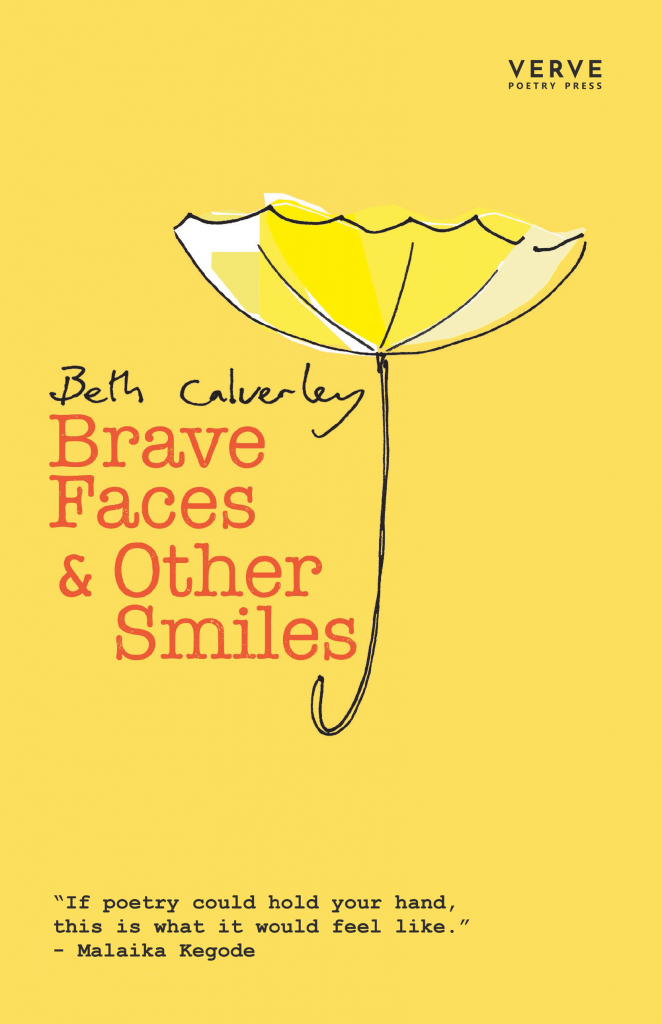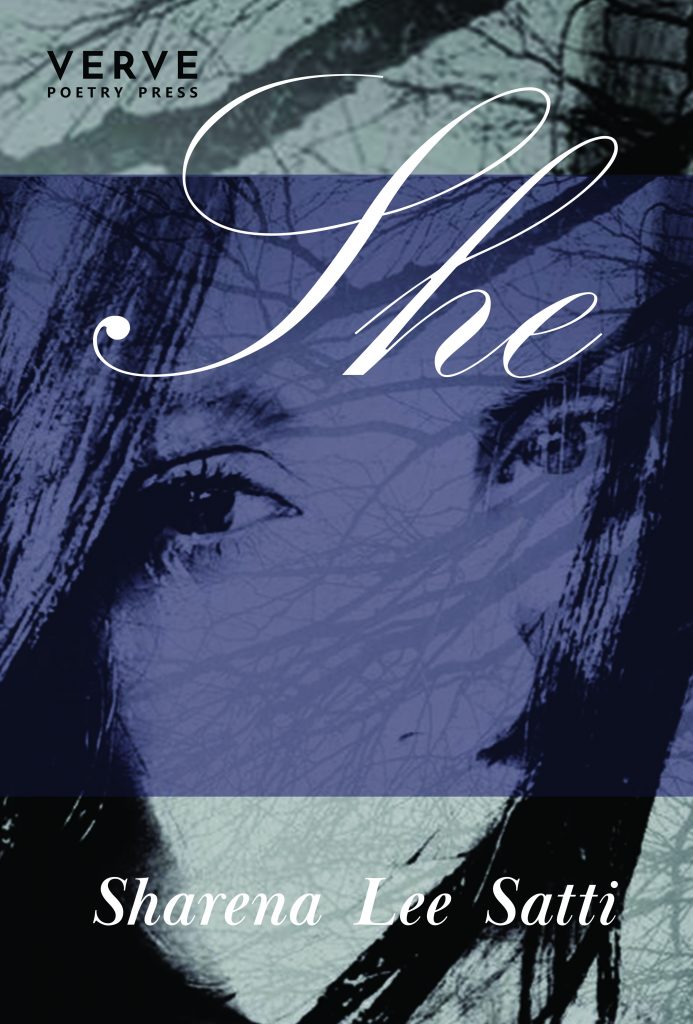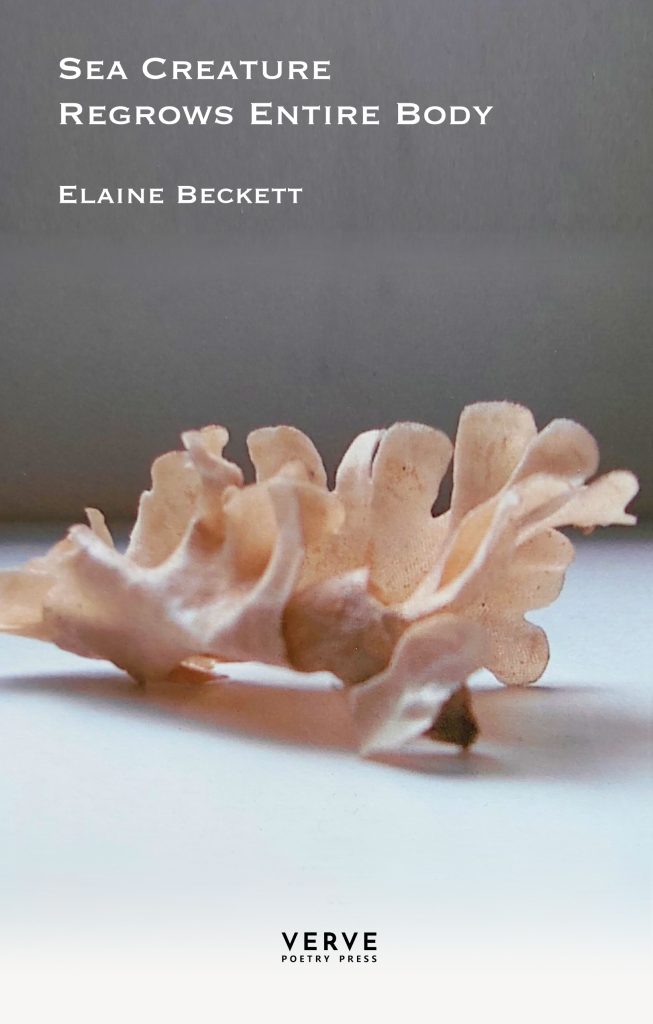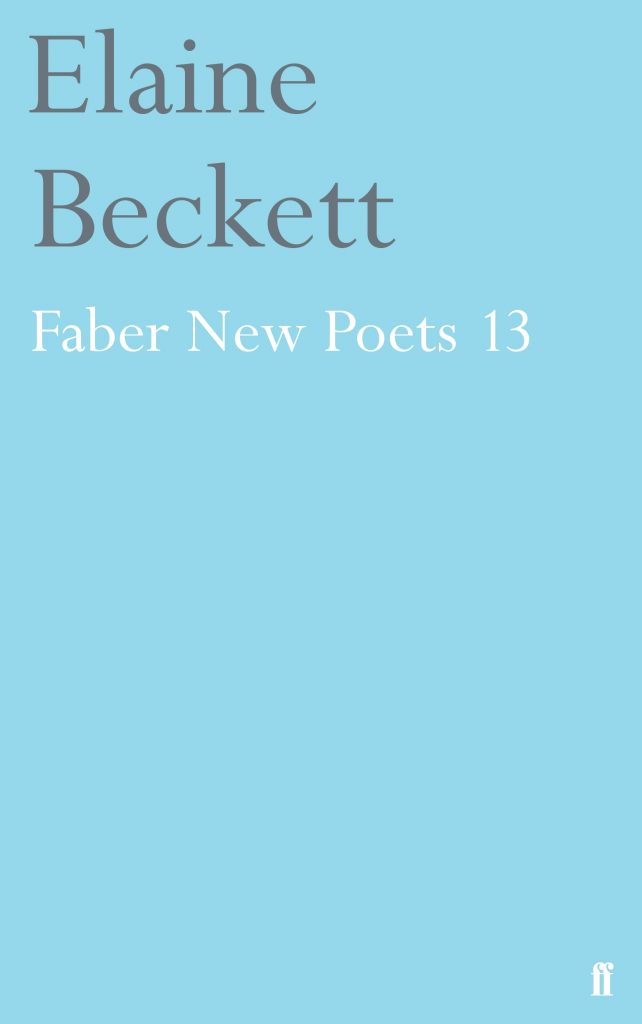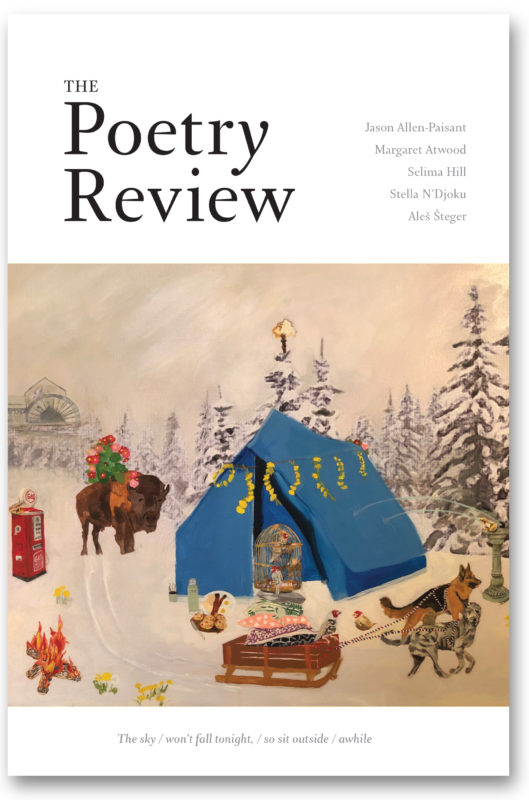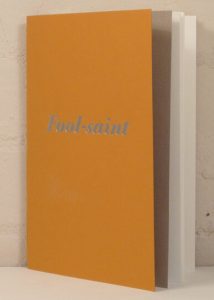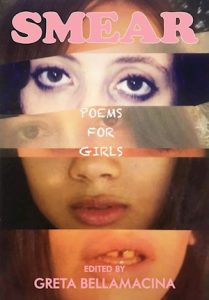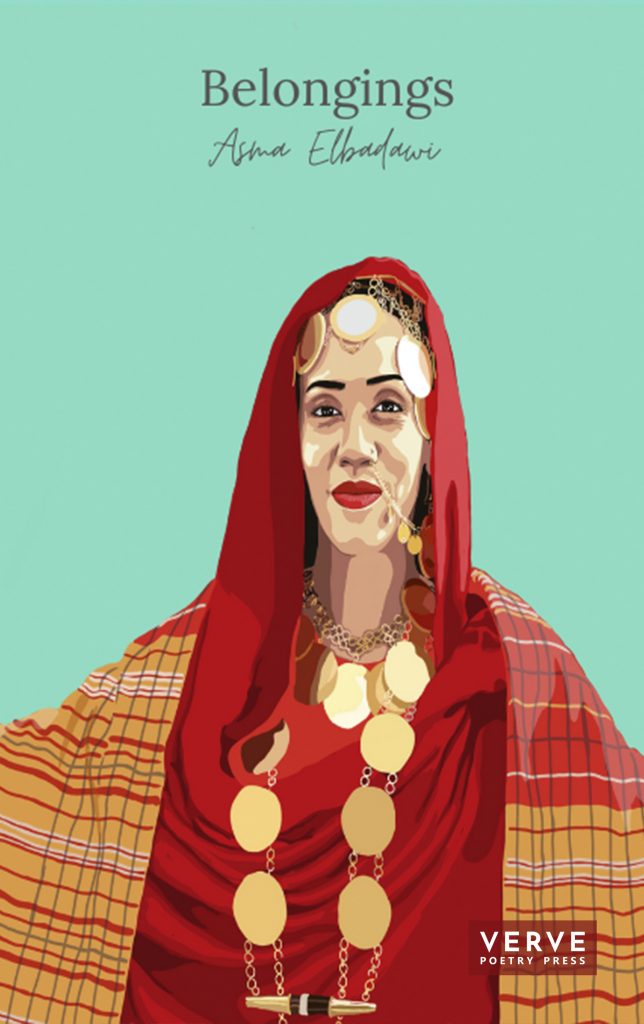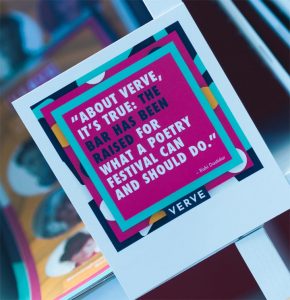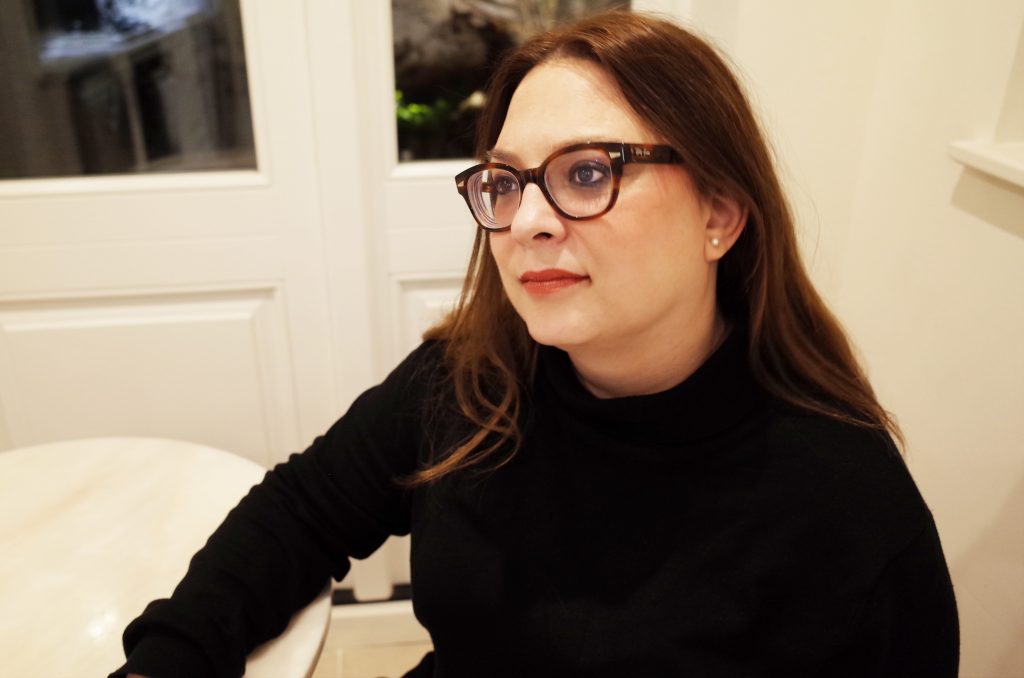
“I have had extremely difficult experiences because of my bipolar illness. I write to transmute that experience and try to relay it so that it’s understandable, and to let readers in to a reality that is normally shut away from the world. Writing for me is an act of therapeutic power.”
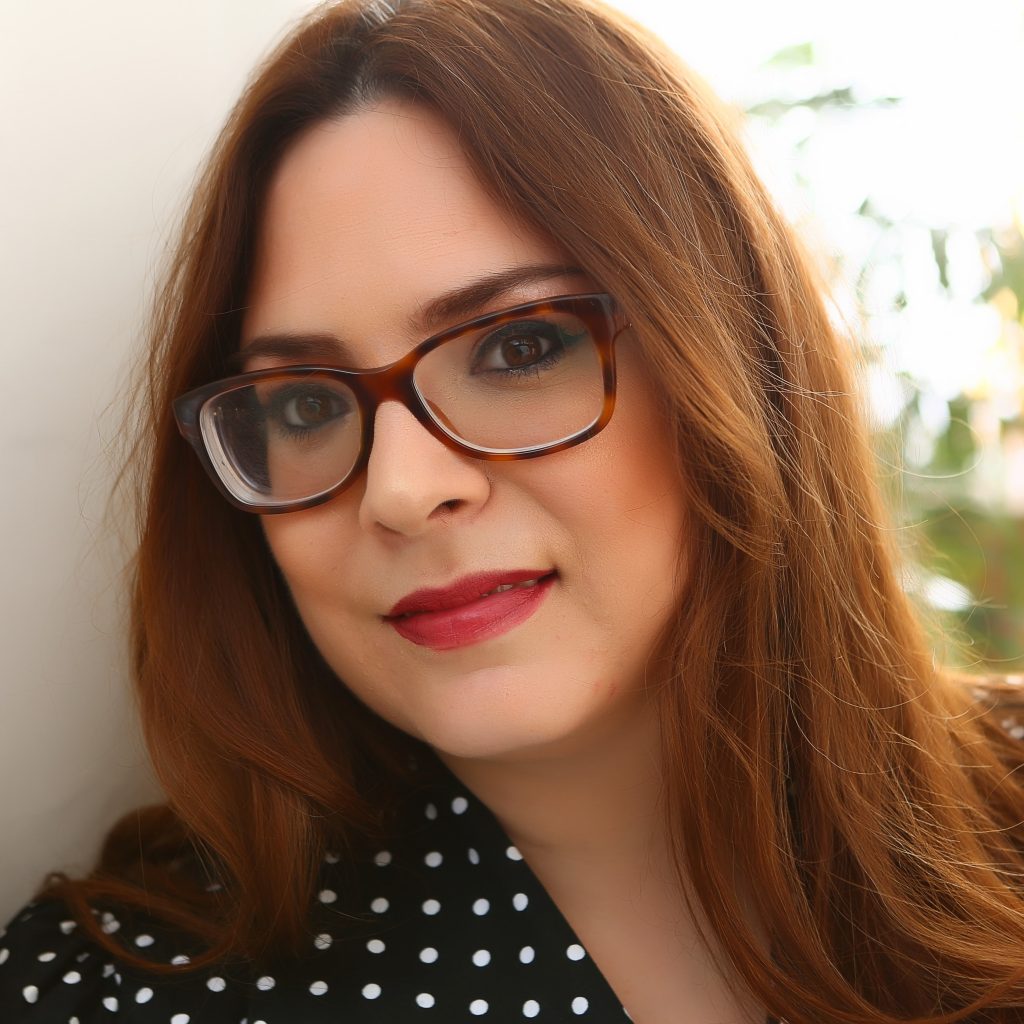
Nicki Heinen was born in Germany but moved to Birmingham, U.K at the age of 6. She studied English at Girton College, Cambridge University, where she won the Barbara Wrigley Prize for Poetry. Her work has been published in a variety of print and on-line magazines and anthologies, including Magma and Bloodaxe’s Staying Human anthology. She was shortlisted for the Pat Kavanagh Prize in 2012, and commended in the Winchester Prize 2018. She founded and hosts Words & Jazz, a spoken word and music night, at the Vortex Jazz Café, London. She lives in North London.
There May Not Be A Reason Why
Nicki Heinen has been sectioned and hostpitalised under the mental health act on several occasions during her late teen and early adult years. As such, her debut collection contains vivid descriptions of hospitals and her incarceration in them.
She has also experienced long periods of freedom, often chaperoned as it is, by its evil twin brother, loneliness. At times, freedom can be an incarceration of its own.
It is no exaggeration to state that, in this astonishing debut full collection, Nicki is able to show that she has the imagination, the wit and the craft to be able to move almost nimbly beyond all these restrictions in her work, producing poetry of great power and invention. It is poetry of some power that can raise you up and out through the roof of the cage and into the air!
SAMPLE POEM
#MeToo
this skin dries bloodless, underneath a ghost scratches pale-blue feather in my mouth turns liquid like tide-pods exploding the sun is absent, a carnation wilts on the grave, a shadow not falling no crater so deep as the hold in my mind, filled with all the things I said all the things you took, all the things undone furniture of the bipolar kingdom, stuffed full of dust-mites burrowed in like spun tops is it not an exercise set for the next time? no, it’s not it’s this moment in which I stand a woman enfettered stand with feather in mouth my blood on your lips, your face etched in the winter air my head splintering, a silent granade
Itch
Nicki’s Debut Pamphlet Itch was launched with Eyewear Press in 2017 and was a London Review Bookshop book of the year.
‘Nicki Heinen’s debut collection is half a lifetime in the making. The voice rings clear throughout every circumstance. Refusing to be dehumanised by medicalisation and attacks on agency, it is exact about its locations and attentive to transformations […] this collection ultimately chooses to sing a love that is simple and animal, and of astronomical proportions.’ – Vahni Capildeo
More from Nicki
Sam J. Grudgings

‘I found solace & sobriety in the poetry community & to repay them I wanted to write a wonderful grisly spectacle to sate their morbid curiosity & to challenge the notion that recovery has one set path or that any of them are easy’
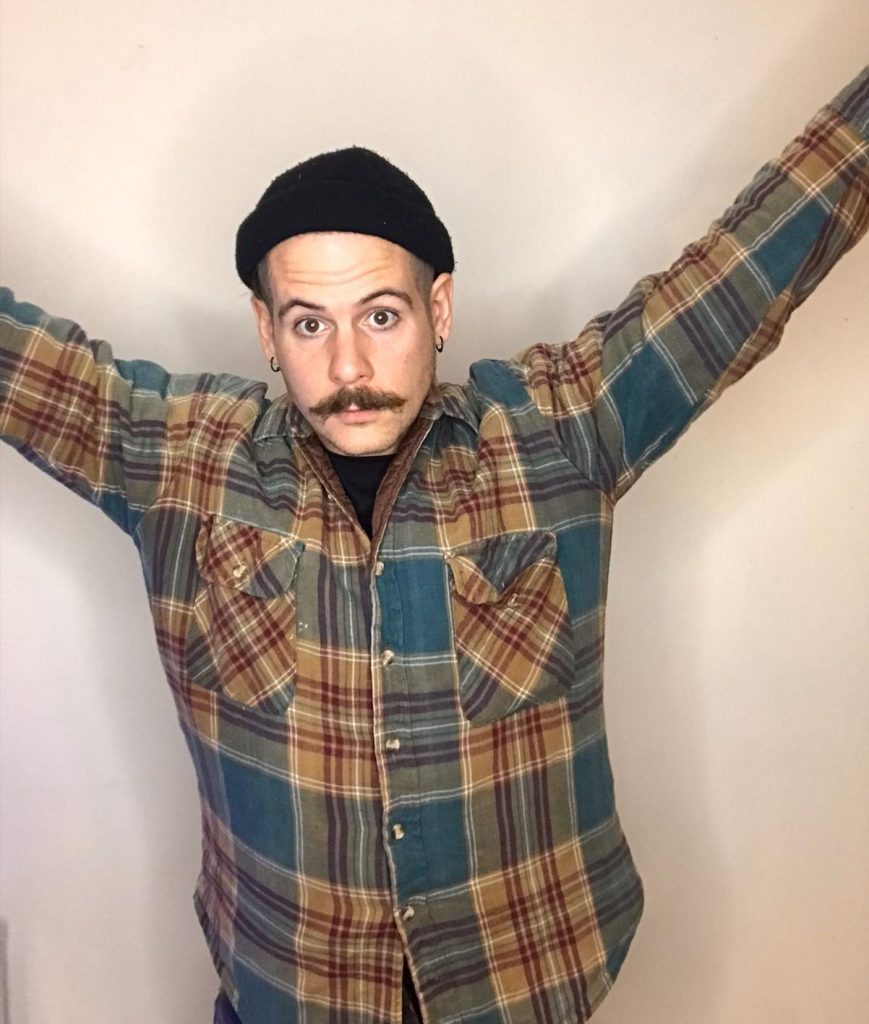
Sam J. Grudgings is a poet perpetually on the edge of collapse, shortlisted for the Outspoken Prize 2020 & longlisted in 2019. Renowned for his off-kilter, frenetic delivery & boundary pushing stage dynamic, Sam grew up in the punk scene & it shows.
Injecting gallows humour into fiercely wrought metaphors, Sam subverts the narratives of addiction, bringing a wry touch to devastating subjects whilst still allowing himself the space to be painfully candid & devastatingly vulnerable. He yells stories about recovery, mental illness, loss, fighting god & cities made of teeth because it’s cheaper than therapy & is less physically taxing than pornography .
Sam runs workshops on performance as well as campaigning for the recognition of lived experience in professional & academic circles. He endeavours to bring poetry to everyone eventually. He can be found if you know where to look.
THE BIBLE II
A defiant splatterpunk body horror on the Inneracy of theological doctrine, in the context of recovery, addiction, death & grieving. A kind of reverent aching. A glorious descent into havok & profanity.
Exploring what god is to an addict, The Bible II is a gory, surreal How-Not-To-Guide for alcoholics coming to terms with their own saviour complex in absence of traditional methods of recovery.
The world is ending but if you need something a little more holy to guide your soul wherever you think you are heading this might be it.
SAMPLE POEM
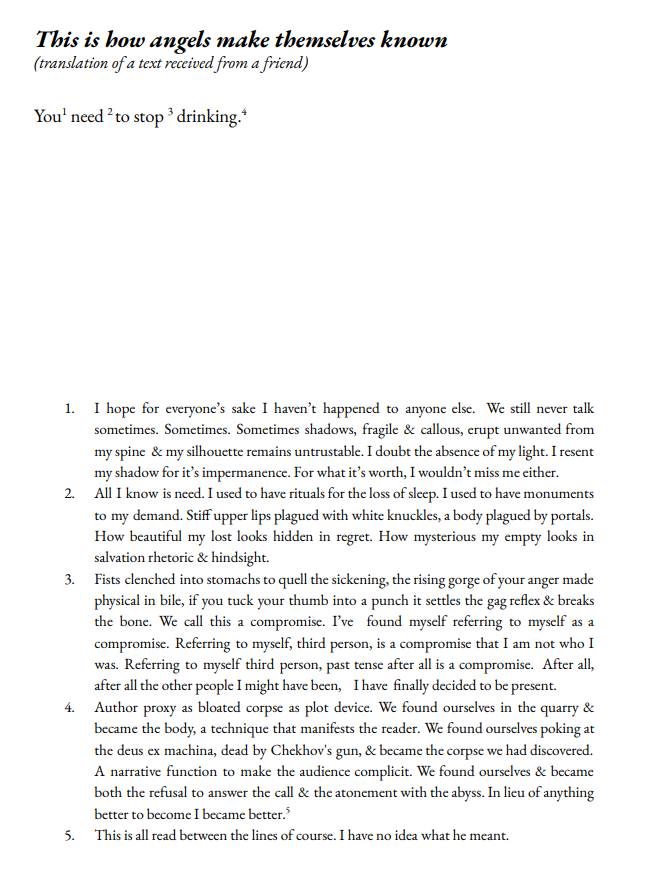
SM(ART) - BEDROOM SESSIONS
As part of sm(art) festival 21, Sam performed his poem ‘Redeemer’ (which features in The Bible II) from his bedroom in Bristol.
Flustered, inimitably poignant, and profound, Sam experimented with 1930s silent film background projection along with his signature frenetic delivery and whirlwind stage presence.
In Conversation with Rushika Wick
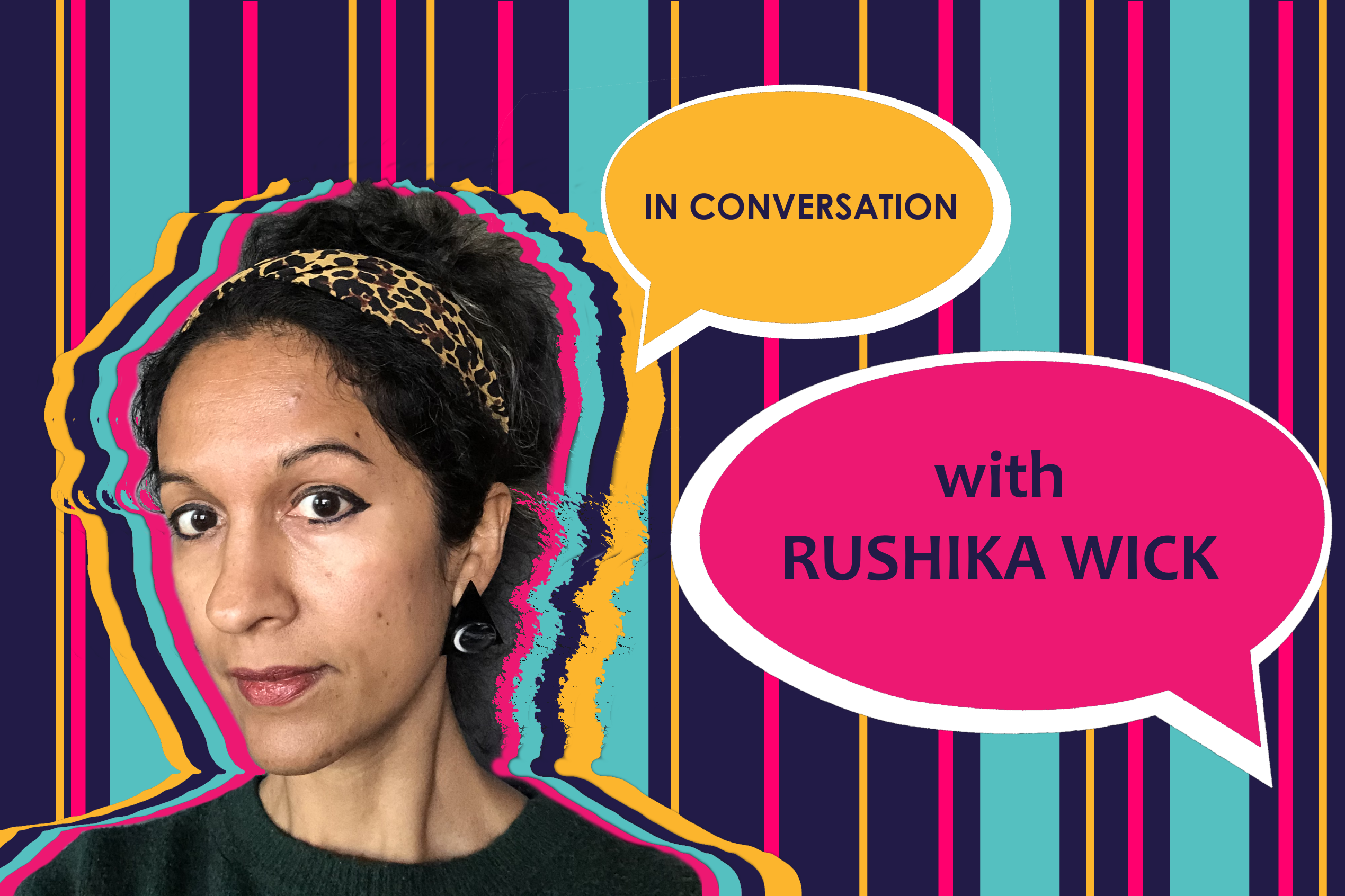
This month, we caught up with Rushika Wick. After a stellar poetry year and the release of her collection Afterlife As Trash, she reflects on the how and why of her work as well as its brilliant reception…
Hello! As always, we start with a catch-up: how are you doing? What have you been up to?
I’ve been observing the lack of differentiation between the seasons with a sense of dystopian dread and countering this by swimming in open water, reading incredible books and hugging people I love inside as many different buildings as possible (we are privileged to have plenty of vaccines available here). One of the things I’ve developed since the series of lock-downs is a deeper appreciation of nature, another is awareness of the poetics of physical space.
Swimming is turning out to be a trend in the poets we’ve talked to this year – Shazea Quraishi talks about it in her interview too.
In terms of news, I’m excited to be an editor for a forthcoming project run by sunseekers poetry and Carnaval Press exploring the broad definitions of ‘Disease’ – follow us on Instagram for the submission period! I’ve also joined the assistant editorial team at Tentacular with a forthcoming issue on Technology (also submit!) Having grown up in a family of cosmologists, nanotechnologists and biologists, this is a dream come true. Asimov remains a favourite author and I’m enthralled by how Jorie Graham writes from the future perspective in her latest collection Runaway.

It’s amazing to hear that you’ve got so many exciting things going on! Speaking of enthralling collections, could you tell us a bit about your weird and wonderful creation Afterlife As Trash?
Afterlife As Trash (I now wish was lower case to be anti-power differential) is a political work exploring ways in which people’s freedoms and lives are constrained and bewitched by systemic controls. In particular, that of late capitalism and the patriarchy. The title alludes to the idea of deferred spiritual gratification being the norm and displaced by material pursuits or distractions.
It invites consideration of the term “trash” which is meaningless as all things can be re-used, recycled in the way that all matter and energy is finite. Waste is arguably a capitalist construct and an extremely harmful one. I’m privileged to have had Fran Lock review the collection with the sharpest senses and wit in Culture Matters (online) magazine- she probably understands the work better than I do, so maybe read her review.
The book also explores our ecological stance as a species in a very between-the-cracks manner. Weeds or wild flowers of such ideas and of the need for a new relationship with nature push through. Ana Seferovic (Verve release pending!) sent me a podcast (LARB) where a performance artist witch – ‘The Oracle Of LA’ – was interviewed. She views green Wicca as being political, as it provides a radical re-engagement with our natural environment via enchantment as a process. This is profound to me.
There are so many of these wonderful and complex ideas explored in the collection – our editor Stuart Bartholomew has said he was hooked from page one! Could you tell us about the first poem of the collection, ‘Diaries Of An Artist in Hiding’?
Diaries was written on the way to work listening to the radio covering the plight of zero hours contract workers during the pandemic, thinking about the struggles some of my artist friends were experiencing. Spending their time doing things they did not enjoy so that they could put food on the table. I find my work as a paediatrician in the NHS very rewarding but at times I am saddened that I would not be supported (by society) to take time out to purely write. There is a false discourse for not valuing The Arts, denying their ethical, therapeutic and heuristic drives which is retrograde.
You won’t find any arguments from us there—we’re grateful for every opportunity we get to platform exciting, interesting and meaningful art but it’s rarely easy.
It sounds like that poem in particular was born from a combination of an idea that had been brewing for a while and an external jumpstart. Afterlife As Trash is such an eclectic collection, it would be interesting to know if your writing process reflects that.
The process is chaotic. I write without a plan, often during liminal times – falling asleep or in transit. Thankfully Bernadette Mayer endorses lucid dreaming for best writing.
Much is “found” – either from overheard snippets of conversation, thoughts on paintings or inspiration from other artists and human beings. The poems form like photographic negatives. The collection was pulled together as I realized I had written around the same questions and theme afterward.
I am influenced by everything around me, but some stylistic muses from the canon include Ann Carson, Frank O’Hara, Bukowski, Terrance Hayes and Sylvia Plath. Also Patti Smith, Rave culture and Picasso. I’m not young anymore which is great because I’ve read more and care less.
There are a whole host of characters who flash in and out of being in the pages of this collection – can you give us some insight into where they come from for you?
I’m more of a visual person and will see/ inhabit a character as I write, which I usually don’t question. They are a multitude but are mostly outsiders in some way, looking in on the world, and in that sense are a chorus. I have been accused of being an unreliable narrator which I partly attribute to a collectivist upbringing in a Sri-Lankan family where there is never just your own voice. I hope I keep a reader with me by the writing being fresh and via thematic continuity, although voice and narrator may change. Perhaps like being at a party rather than catching up with one friend.
Love that as a metaphor. And it certainly does seem like readers enjoyed the party, to say the least. Your poetry has had a brilliant year, from featuring in The Telegraph and The Poetry Review to being well reviewed from Fran Lock as you’ve mentioned and Anthony Anaxagorou who called it ‘breathtakingly impressive’. You’ve recently been highly commended in the Forwards! What has that been like?
I had no idea how it would be received. I write so that I may see. I have imposter syndrome like many of us, for me because I’m not an academic literary writer. Having said that, a big part of my writing is about the community – it doesn’t occur in a silo. Writing groups, performance and The Poetry School have been formative – I live with inspiration all around me and it means so much to have writers I admire support my work as well as readers I’ve never met.
There is of course the hope that you do your publisher justice – I’m lucky that Verve picked this up, that the editor Stu Bartholomew is passionate about variety in poetry and had faith in my work. When I look at the panel of other Verve poets I am very grateful to be amongst them. Many of them are boundary-pushing and occupy unique and active spaces.
They are a lovely bunch, aren’t they? We’re very proud to have you among them.
Rushika launched Afterlife As Trash alongside collections from three more of our amazing poets on May 6th 2021
Finally, the inevitable question: working on anything new?
Haha, I’m trying to write a semi-ecological series using only found words from one book. It’s quite hard and I may give up. I have some visual work curated by the talented S J Fowler coming out in the Seen Not Heard anthology – Kingston University Press, in October. I’m also making poem objects such as contemporary prayer-bandages for pregnant women and love letters to plants.
That sounds magnificent, we can’t wait to see what you do next! Thank you so much for talking to us and good luck with all your experiments!
For more from Rushika, check out her collection Afterlife As Trash or read more about her on her author page here!
Charlotte Lunn
‘There’s still a large stigma around mental health and emotional abuse. The purpose of Metamophosis is to shift perspectives on these subjects and provide a safe space for people to go on their own healing journey and find their voice.’
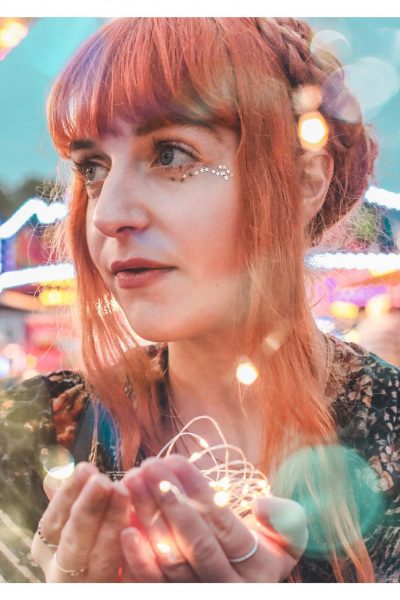
Charlotte is a poet, bookseller and workshop facilitator. After studying creative writing at The University of Derby, she became the Events Co-ordinator at Scarthin Books and has regularly reviewed books for BBC Radio Derby. She has featured at poetry nights across the midlands. When she’s not writing, you can find her in a pile of snacks, on a yoga mat or part way through a cup of tea.
METAMOPHOSIS
Metamorphosis is ‘feeding us to the years we are not yet ready for’, the healing years. A transcendence through abuse which is both about human connection and a connection to nature. Influenced by Plath and spoken word, Charlotte explores her repressed childhood, mental health illness and the journey to recovery.
SAMPLE POEM
Who are you today?
In front of this mirror,
I am faceless,
different masks hang
on the wall, I
must choose one to
wear for
the rest of the day.
A piece of scalp
and jawbone are
missing from one face,
another, its mouth
cleaves to the side
an expression unable
to bear much
at all, I choose the
last face, the one
that is perfect,
the one that has not
yet been harmed,
the one that is not
really mine.
TALES OF DERBY WOMEN PAST
First produced between April and October 2020, Tales of Derby Women Past is a poetry project documenting the unheard and seldom-told stories of women throughout the history of Derbyshire. Charlotte was one of Derbyshire poets commissioned to write and perform a piece under the guidance of She Speaks UK
Sophie Sparham

“I gave up everything to write and perform. I gave up my career, my nine-to-five wage and worked three part-time jobs where I had less responsibility so I could have more time to write and trial workshops. I regret nothing!!!!! This is the happiest I’ve ever been in my life.”
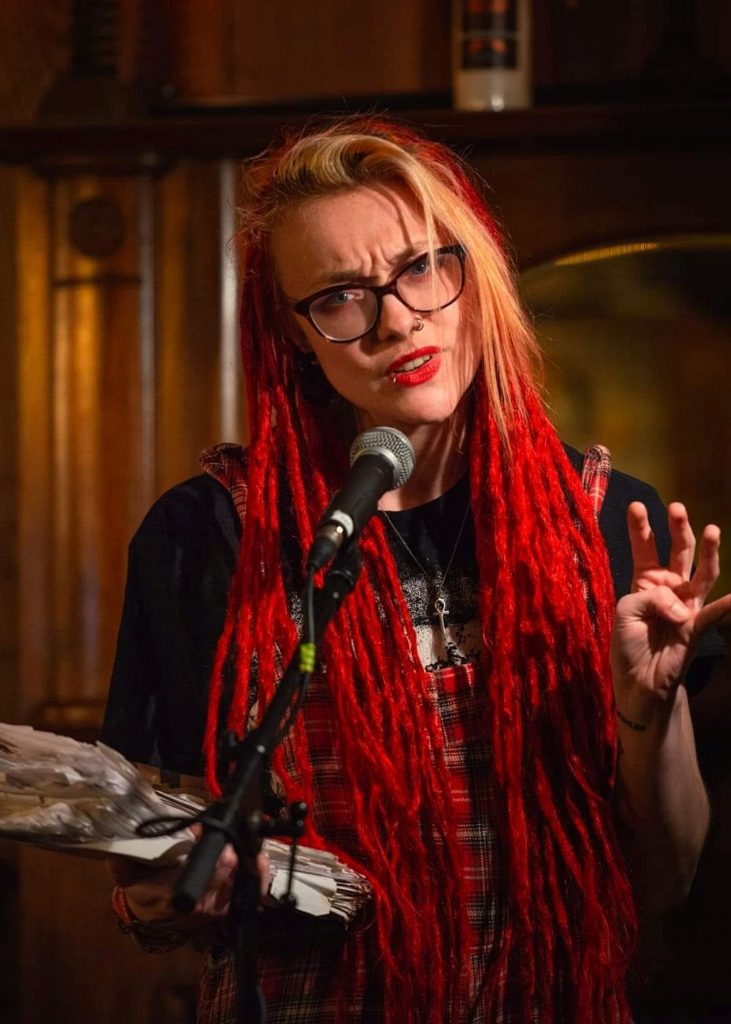
Sophie Sparham is a writer from Derby. She has written commissions for BBC Radio 4, The V&A and The People’s History Museum.
Sophie co-hosts the poetry night ‘Word Wise’ which won Best Spoken Word Night at the 2019 Saboteur Awards. Last year she became the first poet to perform at the metal festival Bloodstock Open Air.
THE MAN WHO ATE 50,000 WEETABIX
‘If I was asked to make a film of my life / I’d capture every unextraordinary moment.’
‘The Man Who ate 50,000 Weetabix’ is a collection which explores the tension between masculinity and freedom in a Derbyshire setting. The poems weave between pubs, fathers, music and the expectations that we put on ourselves.
The collection is a celebration of the mundane: the graffiti on toilets doors, bad take away names, fake ID, Wetherspoons carpets, local Star Trek Appreciation fan clubs and the phrase ‘ay’up’. How everyday rituals and occurrences are weird and magical.
SAMPLE POEM
Sunrise Over Aldi
It won’t always be like this, somewhere
boys will put down their postcodes and weep
into tracksuits, step over double yellow lines
and loiter with one another. On the south side
of the city a mother will embrace her daughter
for the first time, try on her new name and
find that it fits her lips. Caroline she will say,
Caroline, Caroline, you look beautiful.
It won’t always be like this, somewhere
a seventy-year-old bird watcher will buy a motorbike
and find that he too can fly, a black woman
will show a mixed-race girl how to tie a headwrap
and something in her heart will leap. Somewhere,
someone will utter the words; I love you,
I miss you,
I’m sorry.
An atheist will speak Allah and smile at the taste
of honey on his tongue, the dead will climb out of
their graves and shake those standing in line
at the bank. Somewhere, you will look down at the
stars shooting across the duel carriageway and
decide to climb off the iron railings. In the shadow
of the service station, you will wait for dawn.
Beth Calverley
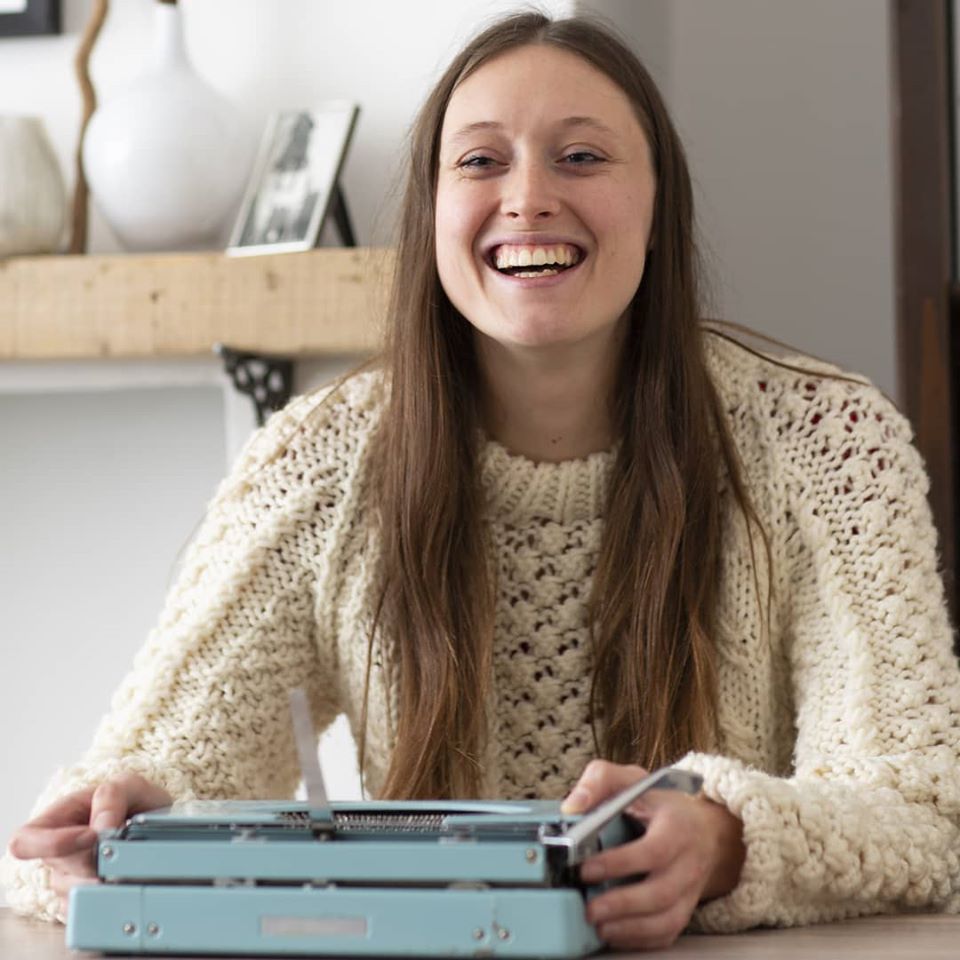
“I feel very strongly that poetry is for everyone. A lot of people think they can’t do poetry. What I say to that is, poetry is just listening to the world, thinking about the world, and writing it down from your own perspective”
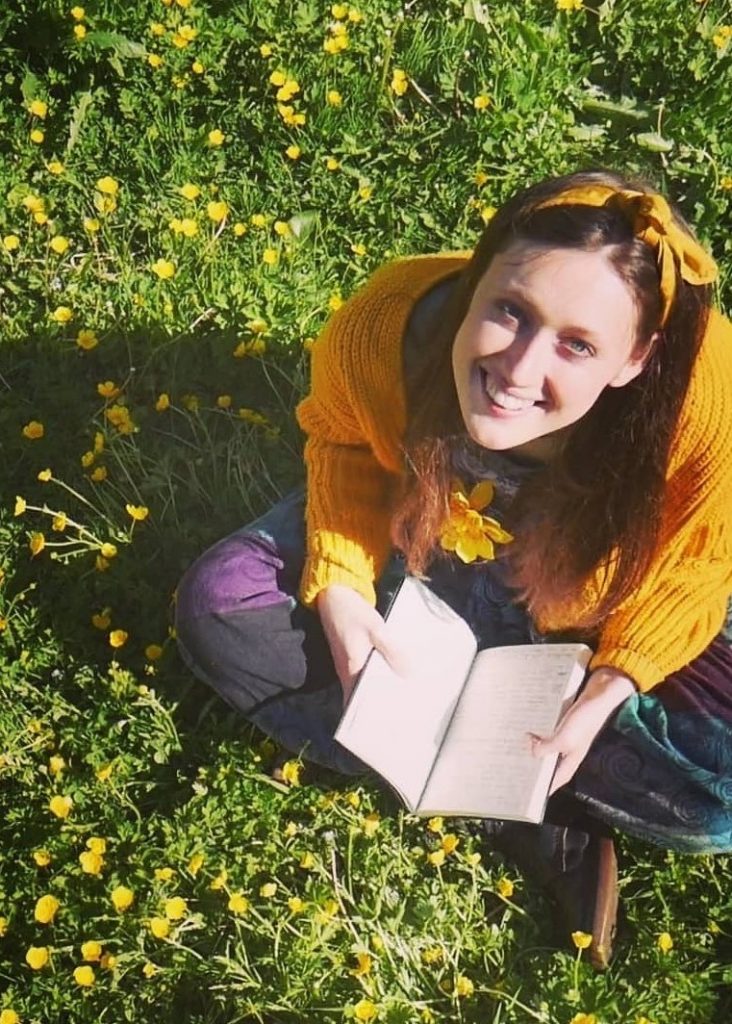
Beth Calverley is a poet, creative coach and founder of The Poetry
Machine. Her poetry lives and breathes, holding your hand through crisp emotional landscapes.
Beth co-creates poems with people via her supportive practice, The Poetry Machine. She collaborates with places of work, learning, care and play, helping people to express what matters to them most.
One of Rife Magazine’s 2018 influential young people in Bristol, Beth was a Roundhouse Slam Finalist 2018 and a Bristol Life Awards Arts Finalist 2020. She is Poet in Residence at UH Bristol & Weston NHS Foundation Trust and was published in These Are The Hands, the NHS anthology endorsed by Stephen Fry and Michael Rosen.
Beth has performed at iconic venues such as Birmingham Hippodrome, Bristol Old Vic and London Roundhouse. She has worked with the BBC, Sky, Oh Magazine and The Prince’s Trust, among many other brilliant local and national organisations. Beth is also part of House of Figs, a music and poetry duo, and co-produces Milk Poetry, a nurturing platform for spoken word in Bristol.
BRAVE FACES & OTHER SMILES
‘…I told you / ‘I really like your smile’ / and, to my surprise / you gave it to me.’
Beth’s astonishing debut collection takes the umbrella theme of the smile and shares it out – with great generosity and care – among a multiplicity of subjects, moods and meanings. Smiles can be brave, shy, sad, or a lighthouse beam of joy. They can be a mess of countless other things.
This subject seems so appropriate to a poet whose presence, way of reaching out to every member of her audience, and most of all her smile, seem to create smiles all around her. Her leaps of imagination take the breath away. Her use of recurring imagery draws a safety-net of light around her listeners and readers.
Some of the smiles that inspired poems in this collection are contributed by people whom Beth has met on her adventures with The Poetry Machine. These poems are worthy of your great attention. We dare you not to smile as you read.
SAMPLE POEM
Spellbound
Amidst the silver clouds and spectacles,
I met you:
lady with the loveliest smile I’ve ever seen.
History rippled your cheekbone map from lip to ear,
cauldrons so clear
I knew straight up
you were magic.
Silence slurped at your cup,
a tiny trick that gave you substance.
Spellbound, I edged closer.
Back then, I was invisible;
too shy to smile without looking for the pieces
of pushed luck in my soul’s reflection,
too shy to risk cracking my face in case it caved.
To me, your laughter lines were loud, sudden.
They drew me in.
The purr of your perfume,
the sheathed claw of your beauty
hinted at a life not read to girls at bedtime.
Your smile was the shock
of near-bad luck turned good.
A black cat walking the right way.
A magpie, joined in the end
by the flutter of a friend.
That’s when you looked straight at me,
like a glass of cold water.
I spilled my thoughts in awe –
appalled at my own daring,
I told you
I really like your smile
and, to my surprise,
you gave it to me.
Sharena Lee Satti
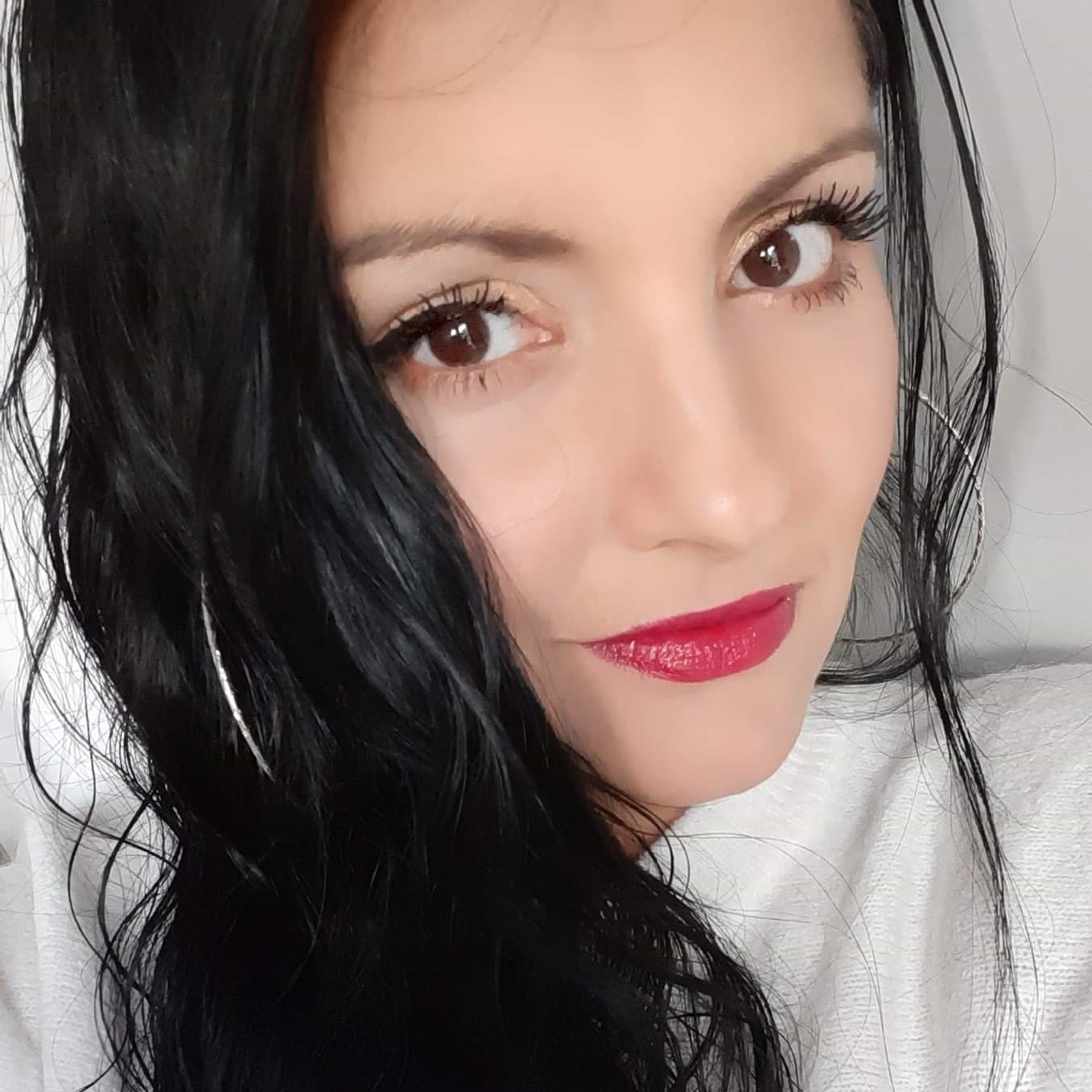
“I write because my heart burns with an
endless desire,
A slave to myself that fuels this wild flower,
Tamed only by spilling ink onto paper,
Releasing emotions that vanish like vapour,
POETRY is my one and only cure.”
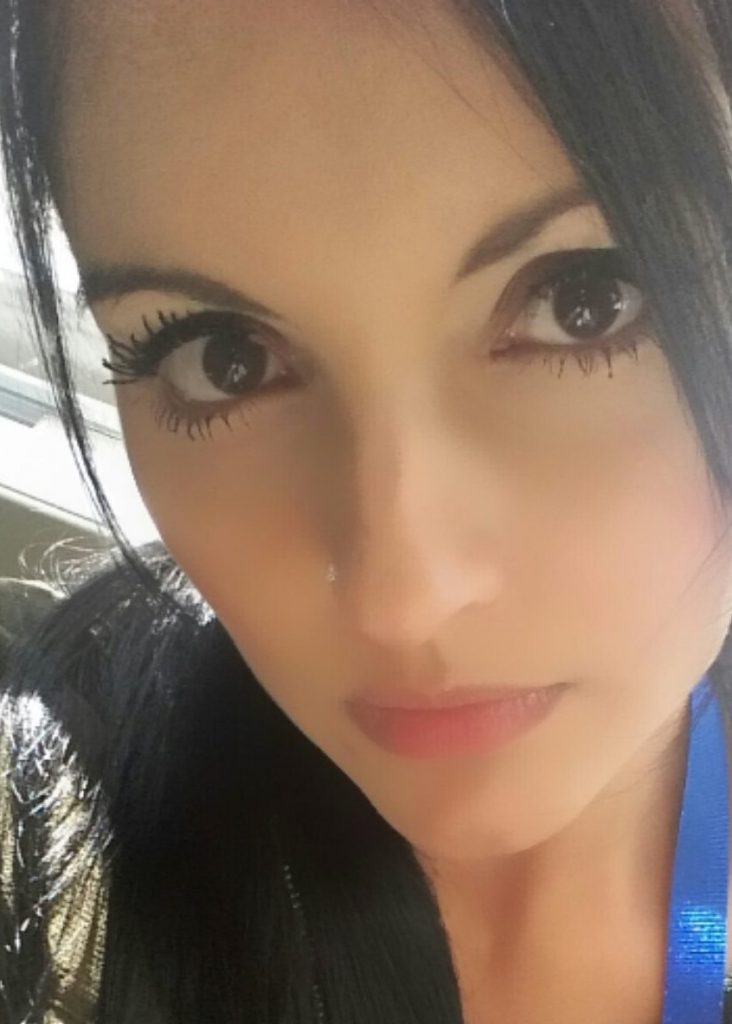
Sharena Lee Satti is an Independent spoken word artist, and Poet from Bradford, West Yorkshire
She is a very passionate poet who writes poetry about her own personal life, current environmental issues, social stigmas, homelessness, poverty and discrimination. She speaks openly about her past and the struggles she had to endure. She found her voice and encourages others to find theirs through poetry and self-expression.
She shares her love of spoken word through performance art. She is an influential, uplifting voice in Bradford, spreading her empathy and love of poetry in her local community.
Sharena has been nominated for the British Indian awards, Media arts and culture and has recently being associated with Chelping, Red Bull amaphiko, Film and Photographer Tim Smith and Balbir Dance, Kala Sangam (The artist takeover) Bradford Festival, Bradford Literature Festival, and BBC radio, NHS, The south square arts centre, Mend, Bradford producing hub, Saltaire festival, Ilkley Lit festival, Bradford Libraries, Leeds Lieder, BBC Leeds, Drystone radio, Bcb Radio and BBC Radio 4.
She has facilitated spoken word events and has worked closely with schools delivering Poetry workshops.
SHE
The poems in She cover an already long career as an inspiring live poet, host and workshopper – it is obvious straight away that Sharena has produced a formidable body of work. Her collection features new work plus some selected poems from her earlier books.
Her poems are real, raw and honest, addressing issues such as survival, cultural-identity, life’s battles, self-love, bod dysmorphia and many other subjects that people struggle to speak about. Her love of nature is also evident. She writes with her emotions to the fore and her heart at the centre – and with a power that can leave you breathless.
SAMPLE POEM
What Is Love?
Its unlimited conversations and pauses of silence
It’s a language that speaks through every heartbeat
It’s a feeling, a sensual kind of healing
That penetrates the soul that has full control of you
And everything that you do, because when you love
You love without limitations or any navigation
Because love takes its own route
It rides through thunder storms and open seas
Tidal waves and a hurricane’s breeze
It’s like an open sky on a summer’s evening
When the sunset fades into the horizon
And you get that warm, fuzzy feeling
Love is an understanding, it’s being patient
It’s holding it together at the times you want to fall apart
When the beating of your heart pulses
When it palpitates, when life sometimes invalidates how you feel
Love carries you to a place that allows you to heal
Love is wireless, its eye communication
It’s an intuition, a spiritual vibration
It’s velvet red roses stemmed with pin-pricked thorns
It’s the early morning sun rays as a new day dawns
Love is eternal, its more than physical contact
It’s loving her soul more than her body in fact
Love is poetry and she is your muse
Your electrical fuse that ignites your heart
Love is a whirlwind of overactive heartbeats
Where eye contact meets
And you know this is the only place you want to be
Where she makes u feel wanted and loved and she shows you
you are worthy
This is Love.
Elaine Beckett
“The great French cinematographer, Robert Bresson, wrote: ‘What I reject as too simple is the thing that is important and that one must dig into’. I find that a very helpful idea; that a poem can start from anywhere. It is the journey it goes on that’s important.”
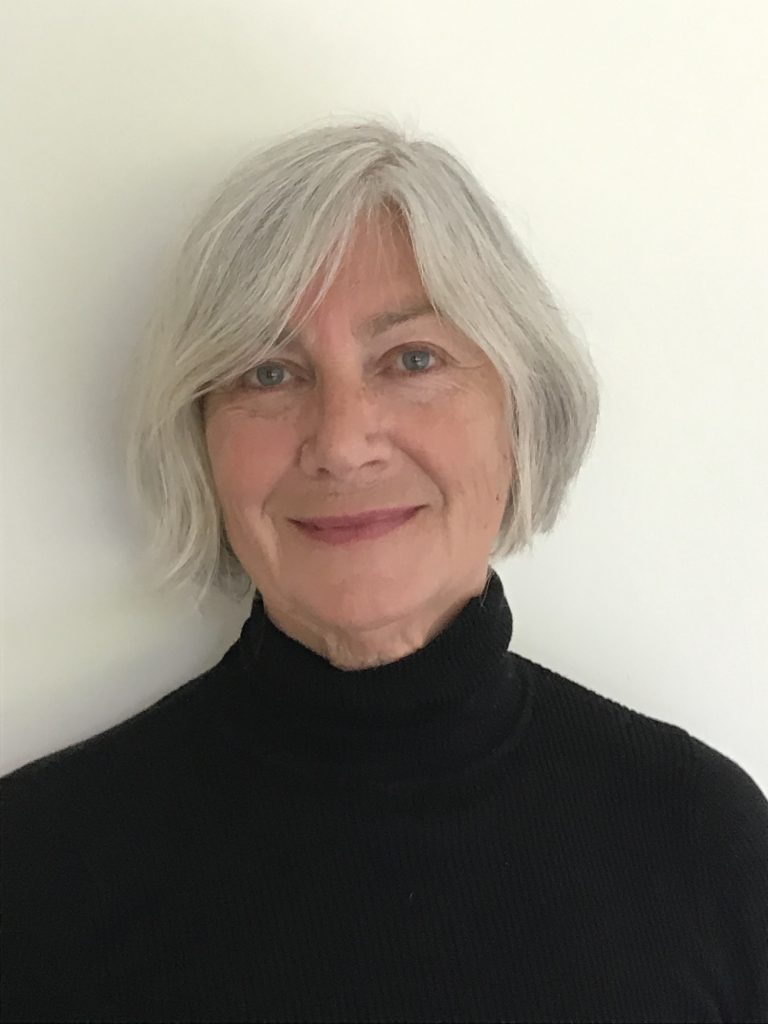
Elaine Beckett was born in London. She trained as a musician and worked for many years with children with special educational needs, also as a theatre and TV composer.
Elaine holds a degree in Architecture from UCL and a PhD from the University of York. Her debut pamphlet Faber New Poets 13 was published in 2016. As part of that scheme, she was mentored by Professor Sinéad Morrissey.
Her work has appeared in The Poetry Review, Ambit, The North, The New European and numerous anthologies. In 2019 her poetry was shortlisted for the Bridport Poetry Prize, and in 2020 longlisted for the National Poetry Competition.
SEA CREATURE REGROWS ENTIRE BODY
The title of Elaine Beckett’s debut collection suggests a process of unstoppable change. Moments of personal and global crisis are juxtaposed, examined from different perspectives, so that her poems show humanity in a constant state of flux. This is ambitious work, acute in its commitment to the truth of lived experience. Beckett’s watch-maker’s eye for detail, impeccable ear, and intricate use of poetic form, reveal truths with a compassion that moves her work way beyond the confessional.
Arranged in seven short sequences, that spiral round themes of loss, betrayal, delight and re-birth, this is a beautifully wrought collection; at times hard hitting and painful, yet witty and moving, and always surprising.
SAMPLE POEM
Calais, or Part of me is at the Opera
A boy dares to leap,
higher than expected with no hand-holds,
the roar of a truck drowning the crack
of the crush of his leg against steel
while I sit watching Carmen.
She has a lot to do:
breathing in, and breathing deep
to last this phrase
and the next, and the one after that,
pitching on towards the final act.
It is breath that we all have in common.
The boy has a life to live,
given all of it again
he still would not have chosen death.
FABER NEW POETS 13
Funded by Arts Council England, Faber New Poets aims to identify and support emerging talents at an early stage in their careers. Through a programme of mentorship, bursary and pamphlet publication, the scheme offers four poets a year the time, guidance and encouragement they require to help in the development of their work in the longer term.
In 2016, Elaine’s work was chosen to be published in this neat pamphlet to a (well-deserved) great reception.
Rushika Wick
“My head is mostly full of nonsense viewed from a constellation of all the high-rises (#solidarity) in poverty London. There are moments of focus on objects in the bin & objects in the sky. Everyone is invited.”
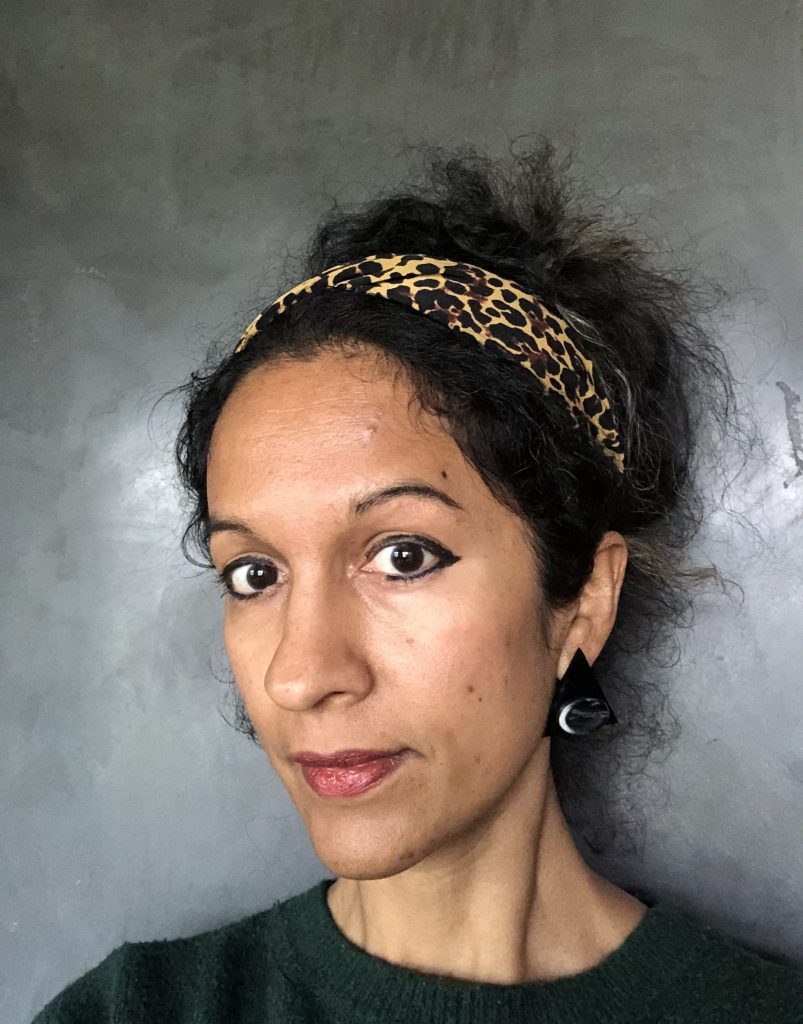
Rushika Wick is a poet, doctor and Children’s Rights advocate who is interested in how social structures and relationships impact the body. She has performed with the Cold Lips Magazine collective in London, Rough Night Press (Amsterdam) and Skylark (Norwich) communities. Her work has been published in literary magazines including Ambit, Datableed and Tentacular and within anthologies including Fool-saint (Tangerine Press), Alter Egos (Bad Betty Press) and Smear (Andrews McMeel).
AFTERLIFE AS TRASH
Rushika Wick’s poems are works of great imaginative power, both formally and in terms of their contents. In the exuberant opening poem of this collection, ‘Diaries Of An Artist In Hiding’, she is by turns the president, Matisse, a love letter, the weather, a badger; ‘the experiment is boundless / like the imagination of a new subspecies /of giant squid / immeasurable and brilliant, / Its owner perceived as a delicacy.’ It is a poem that seems to stand as a sort of manifesto for the whole book, which feels like poetry that contains such energy it has started to wriggle free from the usual constraints of subject and form.
But unlike so much experimental poetry, the reader is brought along for the ride and encouraged to feel the wind in their hair. Characters appear – Camille Claudel, Michael Knight, Lady Chatterley – only to vanish again in a single line once their work is done. Poetic forms are introduced only to be blown apart, words scattering across the page like paint-spatter, letters vanishing to reveal deeper truths. These poems are so full of life even as they acknowledge the stark realities that are a risk to life – also the very real presence of death. And everything is here. And trash is everywhere. And the wind is blowing it and us. It is exhilarating!
SAMPLE POEM
POETRY REVIEW: WINTER 2020
One of Rushika’s recent published works features in the last Poetry Review of 2020. Her poem Hair is available to read for free on the Poetry Society website.
Rushika was also one of four poets (Graham Mort, Meredi Ortega and Jason Allen-Paisant) to perform alongside Review editor Emily Berry at the launch event in January 2021.
ANTHOLOGIES
Asma Elbadawi
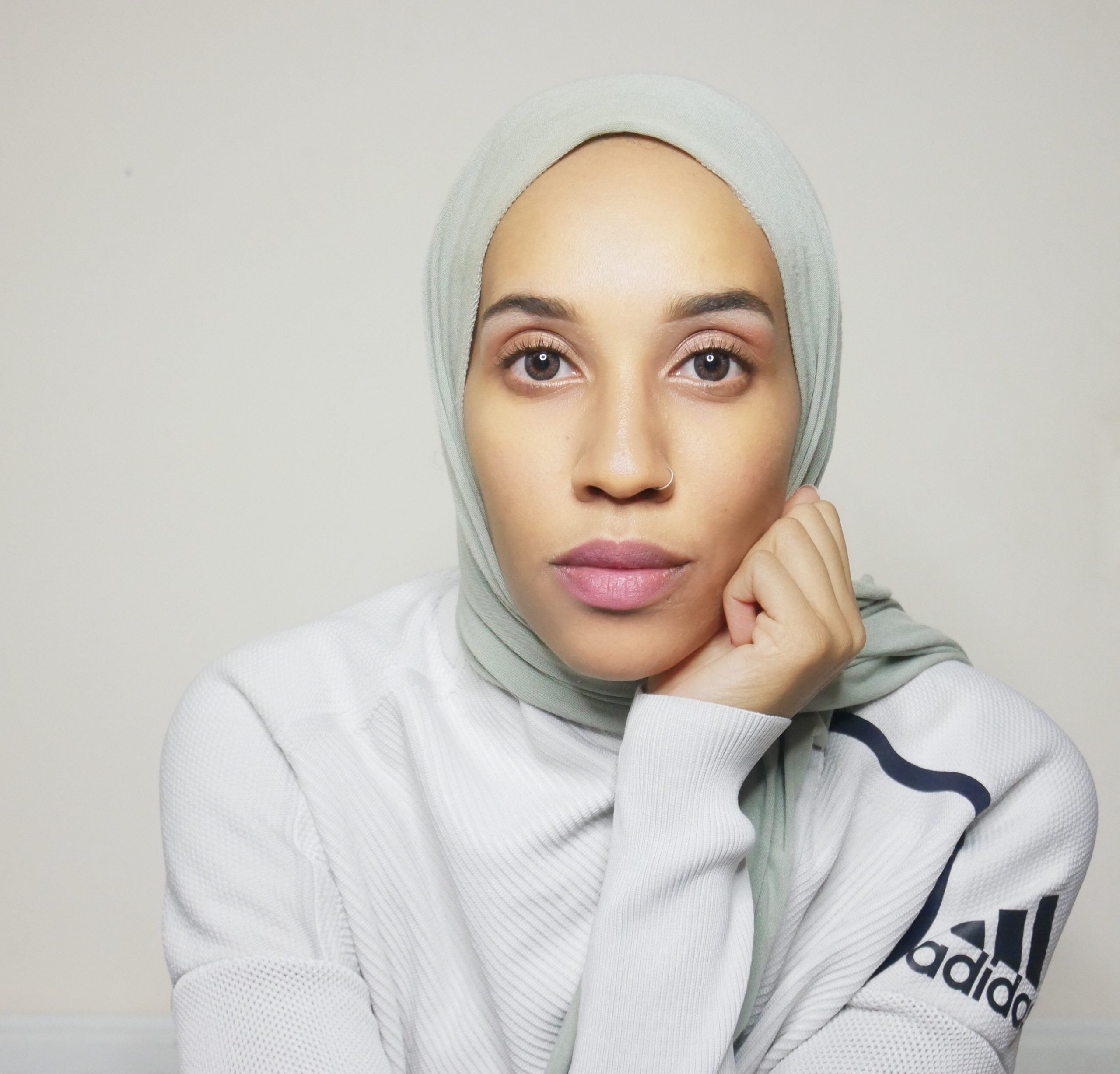
“Many of my teachers predicted I would fail in life. This book is proof to me that I didn’t fail and a reminder that
we are all created in our unique ways, with our own paths and
interests and identities.”

Asma Elbadawi is a British Sudanese (born in Sudan and raised in England) Sports Inclusivity Consultant, Basketball Player and Spoken Word Poet. Elbadawi holds a BA Hons in Photography, Video and Digital Imaging and a Masters in Visual Arts. Her dual cultural heritage deeply influences her creativity with her main focus being female empowerment. She is best known for her involvement in the globally successful FIBA ALLOW HIJAB Campaign. This campaign saw the International Basketball Federation (FIBA) allow Muslim women to wear the Hijab in Professional Basketball and as the 2015 Words First Leeds winner which is a National poetry competition partnered by BBC Radio 1Xtra and the Roundhouse.
BELONGINGS
Belongings is, as it sounds, a collection of thoughts and feelings that depict the very heart of Asma Elbadawi’s life as a British Sudanese woman. A life that contains multiple influences, expectations and juxtapositions. Her poems are raw and unfiltered – Asma holds little back in her work, covering subjects personal to her such as migration, mental health, racism and sport.
These lines that started out as spoken pieces have finally made it to the page, to be read and savoured. Asma presents you with that which is hers. Her Belongings.
SAMPLE POEM
Words
Someone once told me
You should fear writers
They will dissect your wounds
And present you with them as words
Sentences
Sharp enough to pierce right through you
Let you question
At what point did you drop your armour long enough for them?
To read all your fears
Watch you grapple with your mind
Wonder if you’re strong enough to lay with your nightmares
And come out of the other end gasping for air
Use whatever remaining breaths you have left to drag your limbs to safe haven
Bathe in your dreams
And make them a reality
Or if you will choke
The same person once told me
That you should never trust a poet
They have the ability
To spin silk-smooth words that will leave you enchanted
Believing everything they tell you
Holding on to every thread
Drop your armour
Pied pipers, you will find yourself dancing to their sweet tunes
Follow them into whatever danger zone they planted
Fall deeply
For them to leave you hanging
No one stopped to ask how do writers and poets translate raw emotions so eloquently?
What whirl-wind of a storm must their life be in to feel so deeply?
Luckily someone once told me that there is power in your words
People will always fear people like you
Never lose your voice
Use it even if it’s shaking.

